'João deserved to win today' - Vuelta a España leader Jonas Vingegaard searches for positives after narrowly losing to key rival Almeida on Angliru
Dane distances other contenders but recognises major battle remains with Portuguese stage winner

The latest race content, interviews, features, reviews and expert buying guides, direct to your inbox!
You are now subscribed
Your newsletter sign-up was successful
Vuelta a España leader Jonas Vingegaard was left searching for positives after a failure to attack even once on the Angliru stage was followed by surprise defeat by arch-rival João Almeida at the summit.
Vingegaard remains on top of the overall classification in the Vuelta and after staying glued to Almeida's back wheel all the way up the climb, on GC he has distanced all of his rivals bar one.
But having failed to launch a single attack on the ultra-steep ascent which theoretically favoured his type of climbing abilities, it's fair to say that Vingegaard's boosted advantage has at least partly come about thanks to being more than able to match his rival's blistering uphill pace - but never to better it.
Second at the summit, just as he was in 2023 behind then-teammate Primoz Roglič, Vingegaard said that he would have liked to have won after all the work his squad did on the long approach to the three final climbs of the day - the Mozqueta, Cordal and above all the Angliru.
But as he said, too, Almeida had amply merited the stage victory for the way he had made the running all the way up the crucial, steeper second half of the climb.
"I'm a bit disappointed that I couldn't win because my team worked really hard all day, and also for my family," Vingegaard said afterwards about his failure to add a third stage win to the two he has already taken in the Vuelta.
"But I could also follow João, and a lot of the other guys are now at a bigger distance, so that makes it easier for the coming days. João was super-strong, though, I did what I could but he deserved to win, so I'm a bit disappointed."
The latest race content, interviews, features, reviews and expert buying guides, direct to your inbox!
On a stage of over 200 kilometres, nearly twice as long as when the Vuelta tackled the Angliru in 2020 and 70 kilometres longer than the same day in 2023, Vingegaard recognised that the final part of the race had been much harder as a result. That was partly thanks to his own Visma-Lease a Bike squad, of course, who had also set down a blisteringly-fast pace on the first 150 kilometres, thanks to teammates Wilco Kelderman and Dylan van Baarle as they fought to keep a massive break of 25 riders within sufficient distance for the stage victory to come down to the GC group.
But as Vingegaard also pointed out, when UAE began to work hard on the front ahead of Visma some two kilometres from the top of the Cordal, the previous climb, the writing was on the wall about what they were planning to do with Almeida as well.
"From the way they raced at that point, I knew he wanted to go for the victory," Vingegaard said. "He did a super-good climb, although I could follow him."
As he later told the Cycling Podcast, Almeida's speed had been notably consistent on the climb, with only a few minor changes of rhythm on the climb.
"He'd only change pace a little bit," Vingegaard said, "maybe once in a while to take a breath. But he'd only take 10 seconds, and then he'd go harder again."
The end result was that while Vingegaard could follow Almeida, unlike at Limone Piemonte where the Dane outsprinted the field for a first stage win and again at Larra-Belagua where he succeeded in surprising Almeida then staying away, this time round it was his rival running the show.
"Now I have to focus more on João than other guys, so to be honest, at the end of the day, that's something to be happy about," he admitted.
"But I would have loved to win today, the Angliru is a very special climb. Everybody would love to win here."
Visma teammate Sepp Kuss was dropped by Almeida on the Angliru with four kilometres to go. "João was very strong, he put down a hellishly hard pace," the climbing ace said afterwards.
"There are lots of hard stages still to come and we'll have to work very hard against him."
More climbing ahead
Vingegaard's advantage remains a comparatively slender 46 seconds on Almeida, and seeing which rider might gain the upper hand on the second, very different, stage in the mountains of Asturias on Saturday will be fascinating to watch.
Stage 14 is 134 kilometres long compared to the 202 kilometres on Friday. While the category 1 Puertu de San Llaurienzu, the second to last climb, is a much more formidable ascent than those which preceded the Angliru, the final summit finish of Farrapona is a much more draggy, less challenging affair that Friday's monster finale.
"We did it also in 2020, I was pulling there if I remember it rightly," Vingegaard said, "although I can't remember too much about it.
"On a climb like today [Friday], you don't get anything much out of being on the wheels. But on the next ones, drafting matters more, so I guess it will be easier to stay on the wheels, too."
The Farrapona was actually one of Vingegaard's most impressive early ascents as a climber, working on the front for kilometre after kilometre on the lower slopes in order to keep teammate and race leader Roglič's rivals under control.
This time round, with Roglič not even present on the Vuelta, all the attention will be focussed on how Vingegaard and Almeida manage what is increasingly looking like a two-rider fight for the Vuelta.
Time-wise, and in terms of experience as a Grand Tour leader, Vingegaard remains a much greater favourite than Almeida. But after he failed to follow Tom Pidcock (Q36.5 Pro Cycling) on the final slopes of the Alto del Pike last Wednesday in Bilbao, and then did not deliver the much-expected all-out attack on the Angliru, the stakes may well be much higher than he would have liked at this point in the race.
Subscribe to Cyclingnews for unlimited access to our 2025 Vuelta a España coverage. Our team of journalists are on the ground from the Italian Gran Partida through to Madrid, bringing you breaking news, analysis, and more, from every stage of the Grand Tour as it happens. Find out more.
Alasdair Fotheringham has been reporting on cycling since 1991. He has covered every Tour de France since 1992 bar one, as well as numerous other bike races of all shapes and sizes, ranging from the Olympic Games in 2008 to the now sadly defunct Subida a Urkiola hill climb in Spain. As well as working for Cyclingnews, he has also written for The Independent, The Guardian, ProCycling, The Express and Reuters.
You must confirm your public display name before commenting
Please logout and then login again, you will then be prompted to enter your display name.

